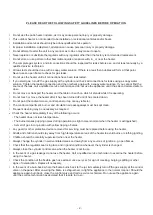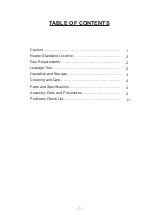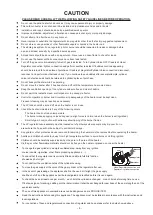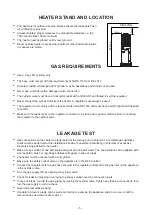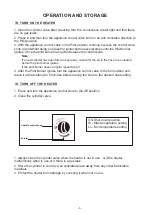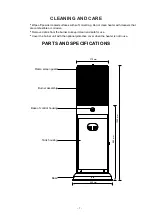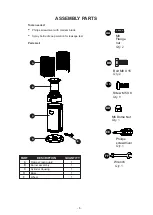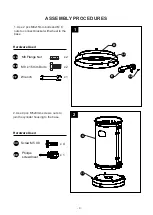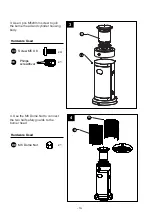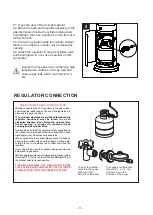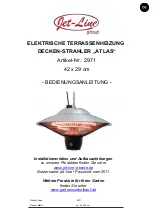
PLEASE READ THE FOLLOWING SAFETY GUIDELINES BEFORE OPERATION
Ÿ
Do not use the patio heater indoors, as it may cause personal injury or property damage.
Ÿ
This outdoor heater in not intended to be installed on recreational vehicles and/or boats.
Ÿ
Installation and services should only be a done qualified service person.
Ÿ
Improper installation, adjustment, alteration can cause personal injury or property damage.
Ÿ
Do not attempt to alter the unit in any manner as to do so may make it unsafe
Ÿ
Never replace or substitute the regulator with any regulator other than the factory recommended replacement.
Ÿ
Do not store or use petrol or other flammable liquids or vapours with, in, or near the heater.
Ÿ
The complete gas system and all connections should be inspected for leaks before use, and at least annually by a
qualified service technician.
Ÿ
All leak tests should be done with a soapy water solution. If there is a leak then bubbles will form at that point.
Never use an open flame to check for gas leaks.
Ÿ
Do not use the heater until all connections have been leak tested.
Ÿ
If you smell gas, turn off the gas supply at the cylinder and check all connections for leaks using a soapy water
solution. Tighten the leaking connection and then recheck again with a soapy water solution. If you cannot find the
source of the leak, call a qualified service technician and do not use the appliance until it has been declared safe to
do so.
Ÿ
Do not move or transport the heater and the table or bench on which it stands whilst it is operating.
Ÿ
Do not touch or move the heater after it has been turned off until it has cooled down.
Ÿ
Do not paint the radiant screen, control panel or top canopy reflector.
Ÿ
The control compartment, burner and circulation air passageways must be kept clean.
Ÿ
Frequent cleaning may be necessary as required.
·
Check the heater immediately if any of the following occurs:
- The heater does not reach temperature.
- The burner makes popping noises during operation (a slight noise is normal when the heater is extinguished).
- A smell of gas in conjunction with yellow tipping o flames.
Ÿ
Any guard or other protective device removed for servicing must be replaced before using the heater.
Ÿ
Adults and children should stay away from high temperatures areas of the heater to avoid burns or clothing igniting.
Ÿ
Children should be carefully supervised when near the heater
Ÿ
Always change the cylinder in well ventilated areas and away from any sources of ignition e.g. open flames.
Ÿ
Check that the regulator seal is in place and in good condition whenever the cylinder is changed.
Ÿ
Always close the cylinder control valve when the heater is not in use.
Ÿ
In the event of a gas leakage do not use the heater. Call a qualified service technician to examine the heater before
using the heater.
Ÿ
Check the condition of the flexible gas hose at least once per year for sign of cracking, bulging, splitting or other
signs of deterioration. Replace if necessary.
Ÿ
In the event of a burn-back, where the flame burns back to the jet, immediately turn off the gas supply at the control
valve on the panel. After ensuring the flame is extinguished, re-light the appliance in the normal manner. Should the
appliance again burn back, close the control valve and call a service technician. Do not use the appliance again
until the service technician has declared that it is safe to do so.
- 2 -


